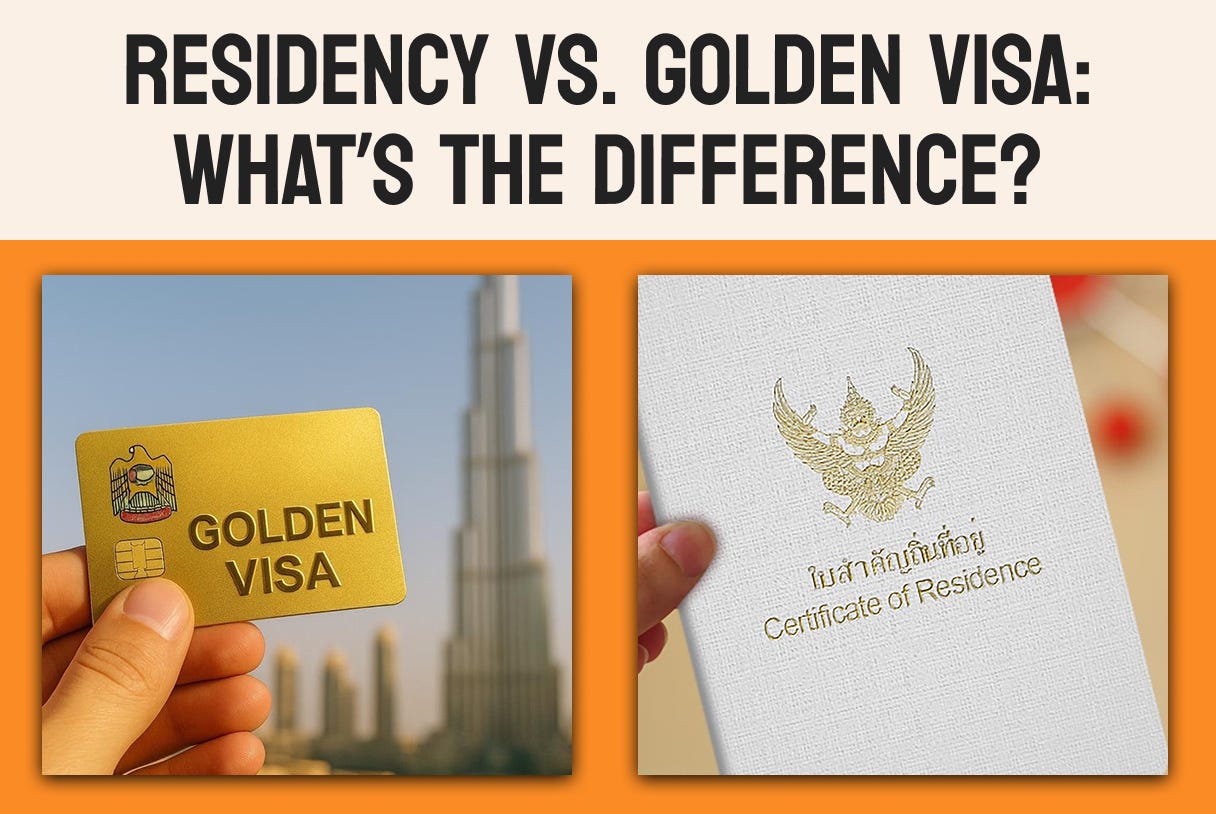Residency vs. Golden Visa: What’s the Difference?
And which one makes more sense for you?
What’s the difference between a residency and a golden visa?
It sounds like the same thing.
Both let you live abroad, both can open doors to citizenship, and both are advertised as the “easy way in.”
But they’re not the same. And today, we’re gonna get rid of the confusion those terms might cause you.
Here’s what we’ll cover today:
Definitions in plain English: what each term really means
Costs and requirements: who qualifies, and how
Paths to citizenship: how they overlap, and where they diverge
By the end, you’ll see which path makes sense for your life plan.
#1 Definition & Basics
Residency is the legal right to live in a country.
It’s usually granted because you work there, study, have family ties, or show enough income to support yourself.
Think of it as the government saying:
“You can stay here long-term, but you still need to follow our rules and renew your permission.”
A Golden Visa, on the other hand, is a type of residency permit you get by investing money.
Usually it’s real estate, government bonds, or creating jobs. Instead of proving income or ties, you prove commitment with capital. In return, you often get more flexible rules about how much time you need to spend in the country.
Takeaway: Residency = permission to live. Golden Visa = residency through investment.
Examples:
Portugal’s D7 residency allows you to live there if you can show stable passive income (such as rental income or a pension). But you need to actually reside in Portugal most of the year.
The UAE Golden Visa allows you to qualify through an investment (like property worth AED 2 million, roughly $550,000). It gives you a 10-year renewable residency with no minimum-stay requirement.
Read more about Golden Visas here:
It’s important to note that a Golden Visa is not a separate status from residency.
Both are residency permits. The difference lies in how you qualify: most residencies are based on income, work, or family ties, while a Golden Visa is a residency permit granted through investment.
#2 Cost & Requirements
Residency permits usually require you to prove stability rather than wealth.
This can mean showing a minimum monthly income, a work contract, or family connections. The financial barrier is often lower, but it comes with lifestyle obligations, such as actually living most of the year in the country.
Golden Visas work differently.
Instead of proving income or ties, you prove commitment through money. The exact amount depends on the country:
For Portugal’s D7 Residency, you need to show at least about €10,440 (according to the 2025 figure) per year in passive income, plus 50% more for a spouse and 30% more for each dependent child.
In the UAE Golden Visa Program, you qualify with an investment such as property worth AED 2 million (about $550,000).
Takeaway: Residency permits usually cost less but demand your physical presence. Golden Visas cost more but often buy flexibility.
By the way…
… a cheaper option for establishing residency in the UAE, would be to open up a Freezone company in the country.
#3 Benefits & Trade-Offs
Residency permits are usually more affordable.
They let you settle in a country with lower upfront costs, but often require you to actually live there most of the year. This makes sense if your goal is to build a life in one place.
Golden Visas are designed for flexibility.
They allow you to keep a base in a country without spending much time there, but the entry price is much higher. You trade money for freedom of movement.
Examples
Spain’s non-lucrative residency lets you live in Spain at a relatively low cost, but you must spend the majority of the year in-country to keep it valid.
The UAE Golden Visa gives you a 10-year renewable residency with no stay requirement, but only if you invest significant capital.
Additional trade-offs to consider
Work rights
Standard residencies based on work, income, or family ties usually include a straightforward path to employment.
Golden Visa programs vary. In some countries, like Greece, they don’t grant employment rights unless you apply separately. In others, like Spain or the UAE, they do include the right to work, study, or run a business.
Tax residency
Standard residencies often require you to spend most of the year in the country, which usually makes you a tax resident.
Golden Visas usually have low or no presence requirements, which can help you avoid triggering tax residency, though you still need to manage home-country tax rules.
Compliance burden
Standard residencies can involve more in-person renewals and local bureaucracy.
Golden Visas are often streamlined and you get more assistance.
Personal example: Thailand
I hold a Thailand Elite Visa, which is effectively the country’s Golden Visa.
Compared to the new DTV visa, the differences are striking.
With the Elite Visa, I never have to deal with immigration visits (which can be the biggest frustration in Thailand).
Opening a bank account or applying for a driver’s license is simple. Renting or buying property comes with fewer questions because the visa signals stability. The DTV visa is far cheaper, but it lacks these perks. Holders often run into more bureaucracy for the same everyday tasks.
Takeaway: Residency permits are cheaper but tie you physically to a place. Golden Visas are expensive but buy flexibility, and, in many cases, smoother treatment in daily life that goes well beyond the right to stay.
#4 Path to Citizenship
Both residency permits and Golden Visas can eventually lead to citizenship, but the conditions differ.
With standard residency, the path is usually straightforward: live in the country for the required number of years, integrate by learning the language, and pass any cultural or civic tests.
The trade-off is that you need to actually spend most of your time there to keep your residency valid and to build up the days that count toward naturalization.
Golden Visas can also lead to citizenship, but only if you meet the same physical presence requirements as standard residents. The visa alone is not enough. Some investors assume they can simply buy a passport, but in reality, the passport only comes after years of residence and integration.
Examples:
In Spain, naturalization usually requires ten years of continuous residence, reduced to two years for citizens of Latin America, Andorra, the Philippines, or Portugal. A Golden Visa can count toward this, but only if you actually live in Spain and meet the physical presence rules.
In the UAE, the Golden Visa gives you long-term stability, but it does not open a path to citizenship. Emirati nationality is only granted in exceptional cases, usually by government nomination (actually this is almost impossible to get, but in general UAE citizenship is a really bad example here, I just wanted to keep the examples consistent).
Takeaway: Both residency and Golden Visas can be stepping stones, but neither is a shortcut. If your ultimate goal is a second passport, physical presence and integration requirements matter as much as the type of visa you hold.
Conclusion
That’s it.
Here is what you learned today:
Residency permits are generally accessible and affordable, but they often require you to live in the country most of the year.
Golden Visas are simply residency permits gained through investment. They offer more flexibility but at a higher cost.
Neither option is a guaranteed shortcut to a passport. Citizenship still depends on physical presence and integration over time.
Action step: Before choosing between a residency permit and a Golden Visa, get clear on your real goal. If you want to live and build a life in one country, a regular residency is often enough. If you want a flexible base without committing your time, a Golden Visa might fit better.
Quick question for you:
Do you prefer this shorter, focused format? Or my usual super deep-dive editions that run much longer?
Hit reply and let me know. Your feedback helps me shape future issues.
P.S.
If you found this guide useful, consider sharing it with a friend who is debating their next move abroad. Sometimes the right information at the right time saves weeks of effort.
Appreciate you being here,
— Ben







Wow such educative writeup anyway I prefer this shorter version easier to comprehend compare to the longer version